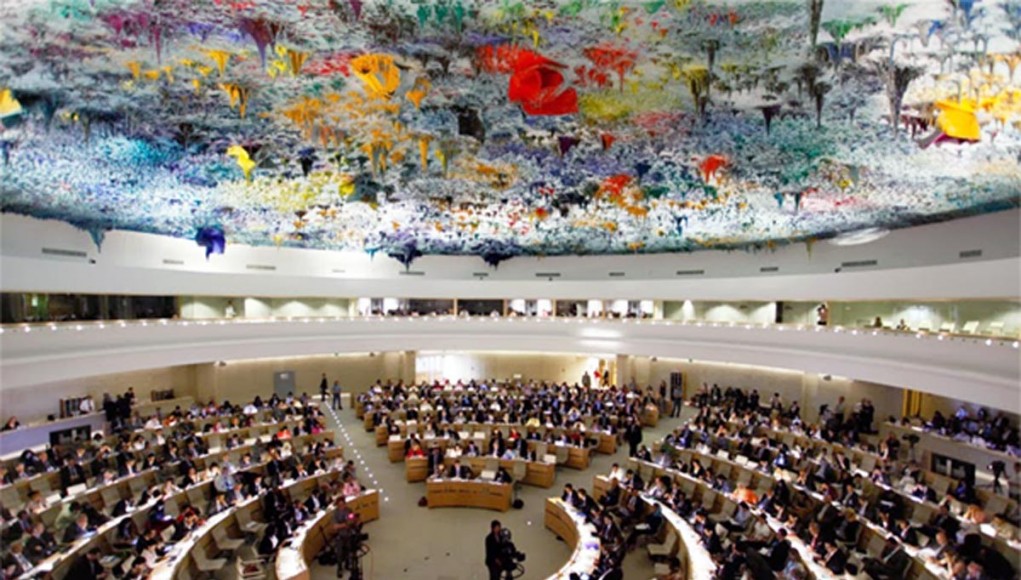The Swiss daily Tribune de Genève (TDG) reported from the United Nations Human Rights Council in Geneva about the calls for a commission of inquiry into Iran’s 1988 massacre of political prisoners. The following is the English translation and full French text of the report which appeared in the print edition of the TDG on 16 March 2017:

Tribune de Genève
“Iran will have to answer for the 1988 massacre”
There is increasingly strong pressure for opening an inquiry into the execution of thousands of opponents.
By Alain Jourdan
16 March 2017
Last August, Ayatollah Hossein Ali Montazeri’s son made public an audio recording in which his father, who died in 2009, is heard mentioning the execution in 1988 of thousands of opponents including women and children.
In total, more than 33,000 people were reportedly targeted by a bloody purge orchestrated by the regime to silence any dissent. Because of the abundance of evidence and testimonies, some 20 NGOs, including Amnesty International and Human Rights Watch, have joined forces with Iranian opponents to urge the international community and the UN not to allow these crimes to go unpunished.
“Today, the new generation is demanding accountability for what happened thirty years ago. Iran will have to respond to the massacres of 1988,” said Azadeh Zabeti, vice-president of the Committee of Anglo-Iranian Lawyers, mandated by the families of the victims of this ‘mass massacre’. “There was a crime against humanity. The evidence is there. We need to investigate and prosecute the perpetrators,” said Tahar Boumedra, a legal expert and former head of the Human Rights Office of the United Nations Assistance Mission for Iraq.
While the spring session of the Human Rights Council is being held, the National Council of Resistance of Iran is multiplying its meetings with diplomats in an attempt to establish a commission of inquiry. Obviously, the parties are aware that the Iranian nuclear agreement and the return of Iran to the diplomatic game complicates the task but they point out that the issue of the fight against impunity has become central. Although they know that they have no chance of seeing those responsible for the 1988 massacres sent to the International Criminal Court, they do not despair of seeing certain courts prosecute under universal jurisdiction for trying crimes against humanity.
The path will be long but the Iranian opponents are patient. They have just marked a very first point. The latest report of the Special Rapporteur on the situation of human rights in Iran mentions the “execution of thousands of [political] dissidents” in 1988. Azadeh Zabeti and Tahar Boumedra recall that the Iranian authorities themselves did not deny the facts. In other words, the international community can no longer act as if this crime against humanity had never existed.
—
Link to original source: http://www.tdg.ch/monde/iran-repondre-massacres-1988/story/23842414

Tribune de Genève
Jeudi 16 mars 2017
«L’Iran aura à répondre des massacres de 1988»
La pression est de plus en plus forte pour obtenir l’ouverture d’une enquête sur l’exécution de milliers d’opposants.
Par Alain Jourdan
15.03.2017
En août dernier, le fils de l’ayatollah Hossein Ali Montazeri a rendu public un enregistrement audio dans lequel on entend son père, décédé en 2009, évoquer l’exécution en 1988 de milliers d’opposants parmi lesquels des femmes des enfants.
Au total, plus de 33 000 personnes auraient été la cible d’une purge sanglante orchestrée par le régime pour faire taire toute contestation. Parce que les preuves et les témoignages abondent, une vingtaine d’ONG, parmi lesquelles Amnesty International et Human Rights Watch, ont joint leurs voix aux opposants iraniens pour exhorter la communauté internationale et l’ONU à ne pas laisser ces crimes impunis.
«Aujourd’hui, la nouvelle génération réclame des comptes sur ce qui s’est passé il y a trente ans. L’Iran aura à répondre des massacres de 1988», explique Azadeh Zabeti, vice-présidente du Comité des avocats anglo-iraniens mandatée par les familles des victimes de ce «massacre de masse». «Il y a eu un crime contre l’humanité. Les preuves sont là. Il faut ouvrir une enquête et poursuivre les auteurs», poursuit Tahar Boumedra, expert juridique et ancien chef du Bureau des droits de l’homme de la Mission d’assistance des Nations Unies pour l’Irak.
Alors que se tient la session de printemps du Conseil des droits de l’homme, le Conseil national de la résistance iranienne multiplie les rencontres avec les diplomates pour essayer d’obtenir la création d’une commission d’enquête. Evidemment, les intéressés n’ignorent pas que l’accord sur le nucléaire iranien et le retour de l’Iran dans le jeu diplomatique leur complique la tâche mais ils font observer que la question de la lutte contre l’impunité est devenue centrale. S’ils savent n’avoir aucune chance de voir les responsables des massacres de 1988 renvoyés devant la Cour pénale internationale, ils ne désespèrent pas de voir certains tribunaux engager des poursuites en vertu de leur compétence universelle à juger des crimes contre l’humanité.
Le chemin sera long mais les opposants iraniens sont patients. Ils viennent de marquer un tout premier point. Le dernier rapport du rapporteur spécial sur la situation des droits de l’homme en Iran mentionne «l’exécution de milliers de dissidents» en 1988. Azadeh Zabeti et Tahar Boumedra rappellent que le pouvoir iranien lui-même n’a pas démenti les faits. Autrement dit, la communauté internationale ne peut plus faire comme si ce crime contre l’humanité n’avait jamais existé.
(TDG)

